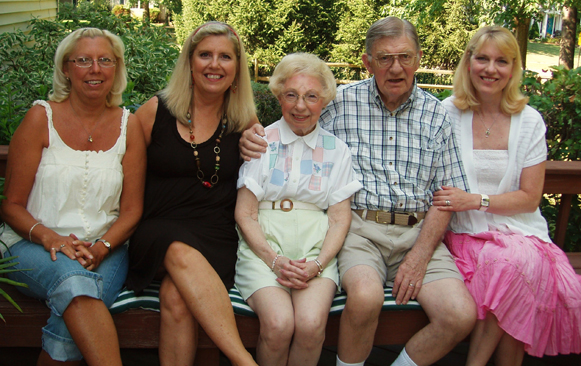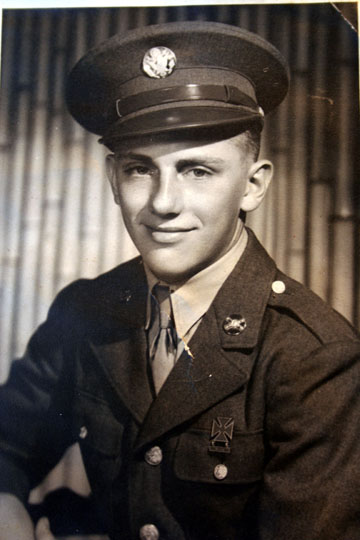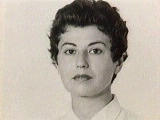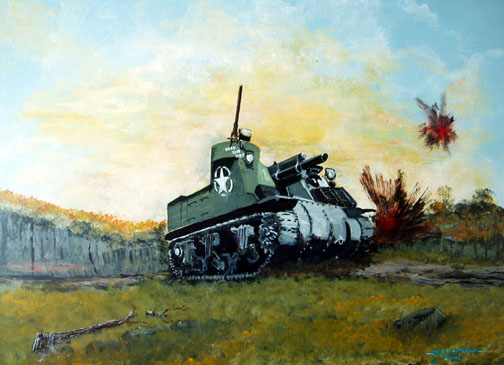“But
Thanks, Ida Orlando”
Uncle Ray, Raymond Elmer Anderson was born in
1924, and had grown up in rural Wisconsin in poverty.
His father, my grandfather, had been killed in a car accident when Ray
was only 10 years old, and the family had known poverty and deprivation.
No electricity, no running water, four brothers and a widow trying to get
by. This was during the Great Depression.
 On
August 10, 2009, my cousin Sharron and I flew to Cleveland to spend some time
with Pat and Ray and their children.
On
August 10, 2009, my cousin Sharron and I flew to Cleveland to spend some time
with Pat and Ray and their children.
They had been married since
1950, and have three lovely daughters.
That evening he gave me a written
outline/summary of his war years so I could look it over to see if I had any
questions.
One small incident he wrote about captured my attention. When he was
drafted in 1943, he was sent to Camp Grant, Illinois, but eventually ended up
with two weeks leave in New York. A
good friend of his, Russ Ray, was from the New York area, and Ray’s wife,
Caroldine, “fixed him up” with a
close friend of hers who was a nurse in training at the Flower and Fifth Avenue
Hospital.
Ray wrote that, “She arranged
to have a friend of hers to be with me. We
made two visits, had a lot of fun. And
my date, Ida Orlando, wrote to me every week.
“I tried to contact her on the trip home, but could never reach her.
But thanks, Ida Orlando.”
It was just a passing sentence or two
in his war experiences, but I could tell from the tone he wrote this that he had
sweet memories of Ida who had befriended this rural Wisconsin youth who was
heading off to war. “But thanks, Ida Orlando”, that little written tribute
to her, all these years later, showed how appreciative he was of her kindness
and affection.
That evening, I wondered if I could
find out something about Ida Orlando. It
was an unusual enough name that I thought I had a chance.
It did not take very long. Ida
went on made quite a career for herself in the field of nursing, and there was a
lot of information about her!*
Ida
Jean Orlando, a first-generation American of Italian descent, was born in 1926.
She
received her nursing diploma from New York Medical College, Lower Fifth Avenue
Hospital, School of Nursing. She
went on to get her BS and MA, and eventually became Director of the Graduate
Program in Mental Health Psychiatric Nursing.
In
1961 her book, The Dynamic Nurse-Patient Relationship was published,
followed by her 1972 book titled: The Discipline and Teaching of Nursing
Process.
Orlando
held various positions in the Boston area, was a board member of Harvard
Community Health Plan, and served as both a national and international
consultant. She was a frequent lecturer and conducted numerous seminars on
nursing process. She was married to Robert Pelletier and lived in the Boston
area.
Orlando's
theory was developed in the late 1950s from observations she recorded between a
nurse and patient. Orlando's theory remains one the of the most effective
practice theories available.
The
use of her theory keeps the nurse's focus on the patient. The strength of the
theory is that it is clear, concise, and easy to use. While providing the
overall framework for nursing, the use of her theory does not exclude nurses
from using other theories while caring for the patient.
Ida
Jean Orlando Pelletier, died on November 28, 2007.
She was nationally known,
famous in the field of medicine and nursing theory.
Not only that, there was video of her on line, and pictures of her as a
young woman! I was thrilled, and I
knew Uncle Ray would be thrilled too.
Further searching, however, indicated that Ida had passed away, and there
was a column “In Memoriam” to her. This
made the news bittersweet.
The next day, after we’d gone
over some of the family history, I asked my uncle if he would like for me to
tell him some information that he didn’t know, and he told me to go ahead.
“I found out about Ida Orlando”, I
said. “She went on to become a
very famous nurse. She has written a couple books, and there are even videos of
her being interviewed on the Internet. But
I’m sorry to say that she passed away recently.
He was amazed and so happy to
know that such a nice young woman had gone on to such success, and he said he
would have loved to have talked to her. He
said it really wasn’t a romance, and he only kissed her once.
She had written to him every week during his time overseas, and he had
tried to find her when he returned.
Pat and Ray and my cousin and I went upstairs to my uncle’s computer and
I brought up the video of Ida speaking about her days as a young nurse, and the
pictures of her when she was young. I
then played a video of her being interviewed about her influence on nursing and
how she was integral in starting to actually involve the patients themselves in
medical treatments.
 I
looked over to my uncle after the videos had played and he had a large tear
rolling down his cheek.
I
looked over to my uncle after the videos had played and he had a large tear
rolling down his cheek.  I’m
sure the videos and pictures brought back the memories of his youth, the
excitement of a young soldier in New York, and the emotions of a time that he
had not considered for many decades.
I’m
sure the videos and pictures brought back the memories of his youth, the
excitement of a young soldier in New York, and the emotions of a time that he
had not considered for many decades.
She was beautiful. Dark eyes,
dark hair, a pretty smile. When you
listened to her on the video, you got the impression she was a very nice, very
intelligent person.
The next day, he told me a
little more about his time with Ida. He
said he had very little time each day to go to New York. It was an hour’s ride
in from the base, and an hours ride back, so they had about four hours total
each day. They went to the hospital,
and spent some time talking on the balcony of the hospital and could look over
Central Park. After that, the four of them went to Murphy’s Bar for a few
drinks. That was about it both of
the evenings. They also went to the
roof of the hospital that overlooked Central Park.
We younger generations cannot realize
what this country was like during World War II, and the way literally everyone
in the country worked together, whether this be risking their lives on front
line or writing to lonely soldiers. My uncle spent his years in the war in
France and Germany in a tank that fired 105 mm shells. 
I would like to thank you too, Ida
Orlando. You brought a lot of joy to young soldier defending his country and
memories that have lasted well over six decades.
++++++++++++++++
World War II veterans are disappearing rapidly, and
their stories need to be documented and the little anecdotes remembered.
It took my uncle a couple of years of urging to finally get something
down.
Talk to your parents, your grandparents, your relatives, and get those
stories. Videotape them if you wish,
or have them write them down. Record
them on tape, transcribe them later.
Share these valuable stories of a past worth remembering with the local
historical societies and other relatives.
Statistics do not tell the interesting stories of people’s lives. This
is why it is so imperative that the stories that bring out the personality and
humanity in people be preserved for future generations.
Not only will the stories be preserved, but it’s just likely that you
will develop a new appreciation for the folks to whom you talk.
I have gained a love and respect for my aunt and uncle that I never had
before because I know more of “their story”.
And get those names and dates down too, that is important as well.
You will never regret it.
And thanks, Ida Orlando.
*There
are a couple of “Youtube” clips of Ida Orlando if you search her name, or
there’s a lot more information on her impact on the nursing profession if you
do a Google search with her name in quotation marks. Amazon has two of her books
for sale.
 On
August 10, 2009, my cousin Sharron and I flew to Cleveland to spend some time
with Pat and Ray and their children.
On
August 10, 2009, my cousin Sharron and I flew to Cleveland to spend some time
with Pat and Ray and their children.  On
August 10, 2009, my cousin Sharron and I flew to Cleveland to spend some time
with Pat and Ray and their children.
On
August 10, 2009, my cousin Sharron and I flew to Cleveland to spend some time
with Pat and Ray and their children. 
 I
looked over to my uncle after the videos had played and he had a large tear
rolling down his cheek.
I
looked over to my uncle after the videos had played and he had a large tear
rolling down his cheek.  I’m
sure the videos and pictures brought back the memories of his youth, the
excitement of a young soldier in New York, and the emotions of a time that he
had not considered for many decades.
I’m
sure the videos and pictures brought back the memories of his youth, the
excitement of a young soldier in New York, and the emotions of a time that he
had not considered for many decades.